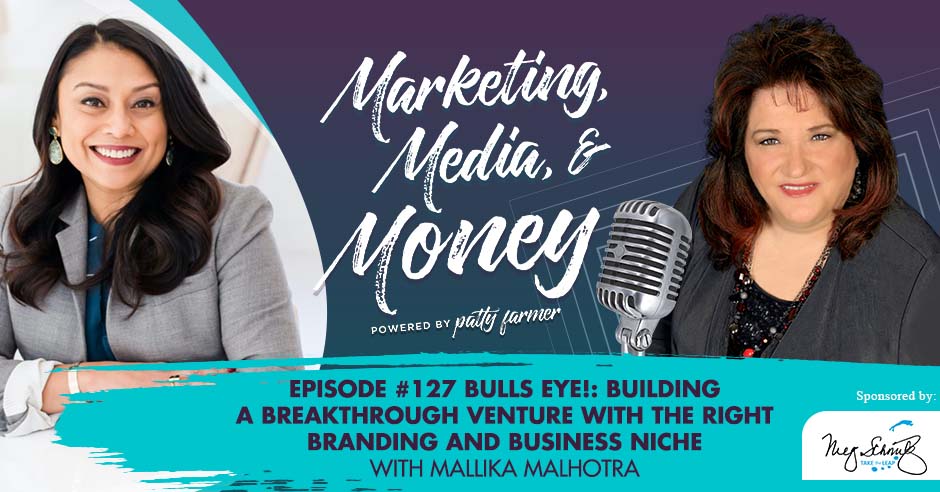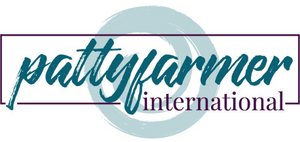Want to know the 7 key areas
needed to ramp up your business?

Bulls Eye!: Building a Breakthrough Venture with the Right Branding and Business Niche with Mallika Malhotra (Episode 127)

Click on the icon to listen to this episode on your favorite podcast platform.
Mallika’s Free Gift: Ready, Set, Brand!
Mallika’s #1 Marketing, Media & Money Strategy
DID YOU LIKE THIS EPISODE? PLEASE GIVE IT A RATING AND REVIEW
About Mallika Malhotra
 Mallika Malhotra is The Brand CEO, an award-winning brand strategist, mentor, and speaker for female entrepreneurs. After years of working in corporate advertising on brands like L’Oreal and Oil of Olay, Mallika now helps women get clear on their brand message, find their power niche, and build their business empire. Her friends and clients call her the brand energizer because she is a strong believer in getting out of your comfort zone, taking action and implementing ideas.
Mallika Malhotra is The Brand CEO, an award-winning brand strategist, mentor, and speaker for female entrepreneurs. After years of working in corporate advertising on brands like L’Oreal and Oil of Olay, Mallika now helps women get clear on their brand message, find their power niche, and build their business empire. Her friends and clients call her the brand energizer because she is a strong believer in getting out of your comfort zone, taking action and implementing ideas.Resources and Important Links
Grab Your Free Marketing, Media, & Money Assessment
Meet Our Sponsor
The Marketing, Media, & Money Podcast (and magazine) would like to thank our sponsor Meg Schmitz, founder of Take the Leap franchise consulting company.
The franchise industry is booming as people look to diversify their income streams with essential businesses, without having to quit their day job. If you have ever considered what it would be like to own your own business with the security of a solid brand behind you, schedule a call with Meg. The conversation is free, and the insights are priceless. https://MegSchmitz.com
Bulls Eye!: Building A Breakthrough Venture With The Right Branding And Business Niche With Mallika Malhotra
I’m looking forward to sharing this industry expert with you. I’m also looking forward to talking about our topic because it is one of my favorite topics. We’re going to be talking about branding, specifically about niche branding and how you can build a breakthrough business if you know how to do it right. Our expert is going to show you how to do it right. Let me tell you a little bit about her.
Mallika Malhotra is the Brand CEO. She’s an award-winning brand strategist, mentor, and speaker for female entrepreneurs. After years of working in corporate advertising on brands like L’Oreal and Oil of Olay, Mallika now helps women get clear on their brand message, find their power niche, and build their business empire.
Her friends and clients call her the Brand Energizer because she is a strong believer in getting out of your comfort zone, taking action, and implementing ideas. I’m so excited to have her here to talk about all those things. She is stepping into my zone of what I love to talk about. Thank you so much, Mallika, for being here with me.
I’m so excited to be here. Thank you for having me.
A lot of times, people are hearing about branding. A lot of times, people think that branding is so many different things. If we asked 100 people, they would all come up with different things. A lot of people think it’s your font, your color, your logo, your this or that. One of the things I feel like I would love to get clear on first is what is the difference between your brand and branding. That way, everybody knows what we’re talking about so they can get clear on it. In your opinion, what is the difference?
Branding is the actual strategy to tell your story. This is how we’re getting some depth in learning about who you are as a brand, who you are, who you serve, what you believe in, and why it even matters. The elements of the brand, the visual elements that people sometimes have a misconception of the logo, the website. These are all demonstrations of the actual brand strategy.
What comes first, the chicken or the egg? The strategy must come first in order for you to have elements of your brand, the visual elements, the photography, all those things that are expressions of that to work well and work powerfully. There is a distinct difference. People often think, “Your brand, it’s your logo. It’s your Instagram feed.” Those are the top line, more fluff. I don’t want to say that they’re invaluable. They’re valuable, but they’re not the depth, the plan and the strategy of how you are telling your story and how you’re positioning yours apart from the marketplace.
Often, I have to bring my clients back down to say, “Before you hire a copywriter, a web designer, or a photographer, we first need to develop the story, the plan. You need to do that first because then the other things will work even harder for you if you get the plan in place.” For me, brand strategy is understanding who you are, how you’re different, who you serve and why it even matters.
I’m in marketing. This is peanut butter and jelly here. I feel like all of those other things are like the assets that you use to help other people to understand what your brand is. We all know that we don’t even decide what our actual brand is. Our customer decides what our actual brand is. We give them all of the assets and how we show up, how we do all those things, but we’re not authentic, and we don’t get the strategy right.
Strategy is my favorite word. I got to tell you that you’re speaking my language here. If you don’t have the strategy right, all of those other things aren’t even going to matter because it’s not going to align. It’s not going to come across as authentic, and they’re going to be confused. They’re not going to know like, “What do you stand for, and what is it that you can do for me?”
Getting clear on strategy is super important. A lot of times, people don’t understand that they always want to start. I know when they come to me, a lot of times they haven’t figured out their brand and what they come to me for marketing, and they’re like, “I do have my logo, and I do know that I love this font. I know that I want these colors.”
They don’t even realize sometimes that even when you’re thinking about color, not that I want to go into this deeply, but the fact of the matter is when you’re doing it, there are a lot of things to consider. If you had a business that was a spa, and you wanted a nice calming strategy, you wouldn’t want your color to be like this huge aggressive red because that color doesn’t work for the experience and the feelings you want them to. There’s a lot more into color besides what are your favorite colors.
It’s being intentional, being mindful, and having a plan instead of being reactive. When we start in business, we often want to launch that website, get our name out there, and pick the colors that we think represent us. If we don’t do that inner work and ask ourselves those hard questions, we often will find those businesses are shifting their websites, playing with a new message, changing their colors, revamping, and rebranding.
They’re in this hamster wheel because they haven’t done the work of asking themselves those hard questions, looking at the marketplace to see where they can fit in, and finding that niche so that they’re more specialized versus being a generalist. When you can get an answer to those big questions, your message is even more relevant and can resonate even stronger with your prospect and your ideal client.
That is absolutely true. I do want to jump into the niche topic because I love it. I want to take one step back first because I love that you’re called the Brand CEO. I love that. When we are thinking about how you worked in corporate advertising on those brands, that is great, yet now you’re choosing to work with women and entrepreneurs. How did you get to where you were doing that, and what made you meander off of that to get to where you are now? I would like to hear your story.
After college and graduate school, I went straight into the corporate world. I was very interested in advertising and marketing. I worked for big agencies and had the opportunity to work for big products like L’Oreal and Oil of Olay, 1-800-FLOWERS, and even some restaurant chains. A lot of what I learned there of how to tell your story through a TV campaign, a print campaign, direct mail, point of purchase, all of those things, the fundamentals are the same.
You have to know what you’re good at and how you’re different and leverage those strengths in your brand and your story. You have to know who your ideal client is and how you’re going to connect with them in a very deep way. You’re going to have to know and figure out in your story why it even matters. What are the values you believe and what is the mission behind the brand? That’s what’s going to attract people to you on a deeper level.

Business Niche: You must know what you're good at and how you're different from the rest. Leverage those strengths in your brand and story.
I was learning those things on big corporate campaigns. As I left the corporate world due to becoming a mother, having a family and deciding then to do much more of an entrepreneurial journey for myself that had more flexibility and freedom for the lifestyle that I wanted, I thought I could use these skills that I learned in the corporate world. I’ll use them in photography because I do brand photography and then also in brand strategy because I was working with female entrepreneurs and small business owners.
All those things still mattered. It’s about connecting with your audience. It’s about telling impactful stories. All of those strategies that work for corporate work for us, too, as solopreneurs. I’m taking those strategies I learned there, strategies I learned in my own journey, being an entrepreneur for many years and having all of the pivots and highs and lows as an entrepreneur. Now I offer them to my clients so they can work harder, work smarter, have shortcuts, and not have to make the same mistakes I may have made along this journey.
We all have a story, and you’re saying you can help us do our story. Look at how interesting your story is. There were a couple of things that I wanted to unpack in your introduction that I thought was good. I love the part where you’re talking not just about branding but about the message. Messaging is so important, and it does go in with the story. You have to have the story before you can talk about the message. I want to talk a little bit about how important that message is. I have to tell you. I love what you said about a power niche. Not just a niche but a power niche.
Let’s go there now because that is important, that you have to have the story that tells them what they need to know about you, “Are you that person?” For most of us in the industry of branding and marketing, there are millions of us. Why should they pick you? I always like to call that you don’t have to reinvent ice cream. You just have to invent your own flavor. Some people still like chocolate, vanilla, and strawberry, but some people love waffle cones and chocolate sprinkles, and you need to find the people who love those things. Even with that said, you still have to have a good message. Knowing who your audience is so you can have that niche is important. I can’t wait to hear about the power niche.
Let’s talk first about what I call your brand brilliance, which is your story. I encourage all of you to take some time to think about the skills you’ve required, the personal and professional experiences that you’ve had in the last several years, the passions that you have, the things that rile you up that make you lose track of time, the values that you have, the things that you believe in that you’re willing to put a stake in the ground for, your personality, who you are, your style, and your vibe. All these layers and things that I’m talking about, like your perspective and point of view, will make your story have soul and depth.
We are more than a marketing person or a brand strategist. We have other layers. If we don’t unpack those layers and share with our audiences the things that we believe in, that we feel we’re passionate about, and previous experiences that we’ve had, then we’re not creating a dynamic brand. There are so many layers to it. I spend time with my clients figuring out all of those different parts of their brand story and seeing if there is a common thread in there that we can focus on and lean into so that they can differentiate from the rest.

Business Niche: Your perspective will give your story more soul and depth. You are more than just a marketing person or brand strategist.
The second part is now that you know what your story is, how does that relate to other people in your marketplace? What niche that you can create for yourself? A specific audience maybe that you can speak to that no one’s speaking to? Do you have an area of expertise that you can own that is different than maybe your competitors have? Do you have a solution methodology that you can brand to help you be distinctive from the rest? There are a lot of different layers in developing what your power niche is.
For those who might not be sure about a niche, whatever it is, a niche is this subgroup of a targeted market. For example, you could be a graphic designer. That market’s very saturated, so it’s very hard to differentiate. If you could have a niche of, “I’m a graphic designer that specializes in book covers,” and all of a sudden, you went from something very wide to something smaller, you could be the queen of that smaller market and developing that niche.
Here you have an area of expertise and are very good at book covers. Second, you are getting specific in your audience. Now you’re talking to authors and crafting that niche that is more memorable, referable, findable, and profitable. It could be more profitable. I hope that helps your audience understand what this is. Niche, to me, is having a specific solution to a specific problem for a specific audience.
That is important too. A lot of times, people are afraid to niche down, but the reality is that it costs you less to market to them. You could be very specific. You’re very clear in the message. You’re not having a broad message. Now your message is so much narrower as well because it’s specifically targeted for that specific group. Also, you’re easier to find because now they’re using those words to look for someone.
On so many levels, having a power niche is important. I know that sometimes it can be scary for some people to do it. I know it sometimes can be. Sometimes when you niche, it’s a big one. You’re going from this to this, and it’s like, “That’s big.” Sometimes it doesn’t have to be as much. For me, with the questions, there are millions of people who do marketing, but I specialize in marketing and media. There’s a differentiator for me. My marketing company specializes in marketing specifically for women.
Somebody told me one time, “Patty, you literally took care of 50% of the market right there.” I said, “I know, but you speak differently to women. Now I don’t have to have my messaging be all across.” I have six daughters. I come from a family of five girls. I like working with women. It is my specialty, and so I love it. It was even hard for me to decide. I would say it, but I had to get my brave on to want to put it on my website. The minute I did, I got more business.
There’s a lot of resistance because you think, “I can serve everyone. I have all the offers for everybody. I don’t want to put myself in a box.” It is exhausting to serve everybody. Years ago, I was a Jane of all trades. I was doing photography for seniors, children, and brand photography. I was doing Instagram workshops. I was doing it all. I call that era in my business the junk drawer business because I was doing so much.
It is not sustainable, and you are not getting paid what you would be as a specialist because now since you’re doing so many things, you’re almost making yourself a commodity compared to everybody else. You are going to position your business for success if you think about who you can niche down to. “Is there a more specific audience? Can I own a zone of genius, an area of expertise, and build my reputation around something? Can I streamline my offerings to have 1 or 2 core offers that I can get known for? Can I create a framework, methodology, or something in my intellectual property that gets me known for something?”
All of those things are going to help you build that power niche. Over time, you’ll know that you get known for that one thing and then you can charge top dollar for that because you’ve become this specialist and are no longer a generalist. People will start seeking you out because you’ve put your stake in the ground for being a certain provider for a certain area with a certain expertise with a certain solution for a certain target.
That is the name of the game. That is definitely what I would call a power niche for sure. Let’s talk about strategy. I love it. When we’re talking about it, there are basics of niche strategy. Can you tell us a few things about basic niche strategy? If somebody is thinking about doing it, maybe just did it, what are some of the basics they need to know? For those of you that are thinking, “I’ve already done that,” then let’s dive into a little bit more advanced strategies for that and stuff. Let’s make sure that we take care of both sides of the equation so people can see this is basic, but as you’re leveling up, this is where it goes.
Let’s talk about how you even find your niche. That’s the hardest part. The first step I would take is you want to audit your own customer base. You want to look at your roster of clients and ask yourself, “Who did I love to work with? Who paid me what I was worth, clients that didn’t negotiate or low-ball me, and who did I get the biggest transformation with?” These are all breadcrumbs and clues to help you then get more specific in your audience.
The second part is thinking about your area of expertise. We don’t want to be a Jane of all trades, so you want to ask yourself, “What do people come to me over and over again? Which one of my offers are selling out the most?” It gives us another idea of where we want to lean into. Instead of doing all the things, we can cut the fat and get very focused. Often this data is already with us. We’re just not doing the work to see it.

Business Niche: Instead of doing everything all by yourself, cut the fat and get very focused. This data is already with you. You are just not doing the work to see it.
The next is you want to look at the competitive marketplace. We’re all in saturated industries, and is there an area that you can disrupt or innovate or carve as your own? We don’t live in a bubble. We live with other competitors. We want to see what that is too. The last piece I would say is you also want to trust your gut. We know what we’re good at. We’re afraid of sometimes putting that stake in the ground, saying no, and putting boundaries, but we need to trust our gut. We are in this for the long game. It’s not like we’re just doing these jobs. We want to build this business for the long game.
We want to be the authority, the expert in the industry. People struggle with finding that niche. Those are the four things I would start off with. When you’re trying to figure that out, do that work, do the audit. Listen and see what people are already coming to you for. Look at the marketplace to see if there are gaps that you can go into to create something new. Lastly, listen to your gut like, “How are you going to be the best version of yourself? What would you be doing?” Use that as a guide to help you figure out where that niche is.
Those are some great questions because people don’t always realize it, but there are things that we do and certain industries or people that we work with that bring us so much joy. You get up every day, and you look at your calendar, and you’re all happy that they’re on your calendar. There are times if you don’t do this, you get up and look at your calendar, and you’re thinking, “Ugh,” because it’s not something or someone that brings you joy.
I learned many years ago that I don’t work with anybody that doesn’t bring me joy because this is our business. It’s our livelihood, but it’s our life. Life is too short to work with people who like don’t make you happy. There are so many people. It’s not like there’s a shortage of people. Finding those right-fit people, as I call them, makes perfect sense. One of the things I would add to that is if you don’t know the answers to that, the people who come to you all the time ask them. They’ll be happy to tell you.
I remember that this word kept coming up all the time that people would describe me, and I didn’t feel like it described me. I was like, “I don’t think that’s me.” It took a while for me to step into it because it was a big word, and it was visionary, and I was like, “Visionary?” I knew I was creative. I went to some people that I trusted, and I was like, “This word is coming up. What do you think?” They’re like, “Absolutely, Patty. That is so you, and you’re such a visionary in how you’re able to then break it down.” I had to step into that. Sometimes it may be bigger than you are now. You will feel like, “I can’t step into that,” but the reality is sometimes it is there. You’re just thinking that you’re not ready and if you can lean into it.
Sometimes you have to pull your audience. Sometimes you have to send surveys out to get their language of what they feel about you and the words they’re using. Another tip I would add is also to look at your testimonials. Often you can find in the testimonials where your niche is because your clients and community are already using the words of where they see your expertise and what you’re good at. If you can go through your testimonials and write down all those keywords and whatever you see as being repeated, that is where your zone of genius is.

Business Niche: Testimonials can help you find your niche. Your clients and your community are already using words that reflect your expertise and where you're really good at.
You might want to lean into that. You might want to own that. When you’re thinking about your niche, and if you want to go with the 2.0 strategy, you have to commit to it. That is the biggest thing. When I say that, it has to be on your website, it has to be in your messaging, and you have to use it in your networking elevator pitch. It has to be consistently across the board where you’re saying, “This is what I’m an expert in. This is who I serve. This is what I do.” You can’t have it up here in your head because no one’s going to know that.
You need to have it all across your marketing and in your touchpoints. You can’t think it’s going to happen overnight. It’s going to take time after the commitment to see how things are going to change for your brand. Give it 3 or 6 months and say, “I’ve decided instead of being a fitness trainer for women, I’m going to be a fitness trainer for women going through menopause who can’t lose weight because of hormonal changes. I’m going to learn about their pain points. I’m going to speak about their pain points on my website and every Instagram story I do and on my LinkedIn posts all across the board.” The more you put it out there and the more repetition, that’s how you build your reputation. That’s how things are going to start unfolding for you. It’s becoming the expert in that because everything you’re doing is within that niche. Committing is part of the process.
It is a process, and I like that because I remember when I came out and said I wanted to be a marketing expert for women, then it evolved into women over 40 because that’s what I like working with. It doesn’t mean there’s not always going to be an exception. Every year I always have at least a few male clients, but they may serve women, work with women, or are a women-owned company, whatever the case may be. It’s not like if somebody wants you, they won’t find you. They absolutely will find you. That’s all in your messaging as well. It’s not like you’re committing to it, but it’s not like it’s your gravestone.
That’s the key here. We have a bullseye. We’re trying to aim and target a very specific customer with a very specific area of expertise, but there are rings around that. Other people are going to be attracted to us. They might not meet the exact profile, but that’s okay. It becomes our decision if we want to work with them. Our message is still simplified. It’s still direct and clear. We’re not talking to multiple audiences. Let’s be honest. The more audiences you’re talking to and the more products that you’re selling, you have micro businesses. You have so many businesses, and it takes energy and time to sell each of those businesses.

Business Niche: Try to target a very specific customer with a very specific area of expertise. However, not everyone will be attracted to you. It is up to you to decide if you want to work with them.
When you niche your business, you are focusing your time and energy, and you’re able to have sustainability. You’re able to step into that expertise and feel good about the work that you’re doing. You’re able to get top dollar because now you are the authority and the leader in the marketplace. You’re able to attract clients because they know exactly what you do instead of, “She does a lot of things.”
That’s how your conversion is going to be higher too. I know you talked a little while ago about risk. I know we get resistance to it, and there are a lot of risks. However, it’s not as risky as we think. There’s a bigger risk of something that you call bland branding. I love that phrase. What a great hashtag. Let’s talk a little bit about that.
Bland branding, to me, is you’re blending in with everybody else. You are a cookie-cutter. You’re a clone. That is when your customers are now making their decisions based on price rather than something distinctive that you’re offering, your personality, results, or process. You’re not sharing the specificities of your brand. You’re bulking in with everybody else.
What happens is a bland brand has a message that’s bland and boring, and nobody remembers it. You wonder why you hear crickets, why no one is booking your discovery calls, and why you may have had one prospect, but they went to somebody else. It’s because nothing is resonating. Nothing is rising above the noise. It is too generic. It is too simple. You want something specific that they can hold onto. Often when your brand is bland, you’re attracting so many different clients, but you’re not attracting that ideal dreamy soulmate client that you are meant to serve
No matter what you do. Who wants to be vanilla? Yes. We don’t want to be vanilla. Back to the ice cream story, even if they want vanilla, they may want vanilla in a waffle cone. They may want vanilla with hot fudge on the top. They may want vanilla, but if your brand is vanilla all the way across, they can buy a book because we’re not in the information business.
Google’s in the information business, and we’re in the transformation business. That matters. Let’s talk about the business benefits of becoming a specialist. A lot of times, people are scared, “I feel like it is the thing to do,” but you have to know what you want to be a specialist in. I know a lot of times I have had people say to me, “Patty, I saw this thing, and it sounds good. I want to be a specialist at that.” Now that would not be the way to do it.
Let’s look at the techniques and what you said. It’s important. Sometimes you will evolve into it in a way you’ll do this. We’re always growing. Even the most successful business owners and entrepreneurs that you’re looking at, if you ask them not about money, “Are you now where you thought you were going to beat the evil?” they probably didn’t know. One day, it’s like, “This is what I’m going to do,” and here they are 30 years later, and they’re a millionaire, and they never change from that.
We all evolve. I don’t think they need to be that scared of it because it will evolve through what you will learn and what your clients will tell you, but there are benefits to becoming a specialist from a business point of view. Sometimes when people can think about what the business benefits are, it can take part of that risk away. Share some of those because I think that helps them.
The first is you will make more money. Let’s be honest. Think about the medical field. You have general practitioners who make money, but as you get more of a specialist, let’s say you are a pediatric dermatologist who specializes in burns. Because they’re so specialized and have more training, they are going to be making higher salaries because they have that expertise.
The medical field is a good example of how you see this. When you become more of an expert, you’re more sought after, and they get higher salaries. That’s the way it is. In our businesses as entrepreneurs, we can have the same thing. If you become a specialist, you can charge top dollar because you are known as the authority and the leader, and you’re different from the rest. When you start doing that, also you get more opportunities in your inbox.
There are panels of speakers. If someone wants a speaker on niche strategy because I’ve positioned myself as a niche strategy expert, my name is going to rise above other business coaches and brand strategists. It’s the name of the game because I put a stake in the ground for that. You can get press and publicity from that as well because often, when you are getting press, people want experts. They want leaders who have been doing this work and have this area of expertise.
There are a lot of benefits that can come from that. Those are financial and visibility benefits. Also, internally, you feel so good about working in your area of excellence, becoming a master. You no longer feel like a copycat. You no longer feel like an Imposter syndrome. Often those things we feel as new entrepreneurs. You feel like a fraud. Those things are all put aside because you’re not doing all the things. You are doing one thing. You’re staying in your lane, you are becoming a master, you are building your expertise, and now you feel much more confident.
I find that a lot of times when people want to use speaking as a strategy, they think they have to be a speaker. We hear it all the time. “I’m a speaker.” During COVID, everybody became a speaker. Just because they could get on Zoom and talk to a networking group, they were a speaker. The fact of the matter is we don’t hire speakers. We hire subject matter experts. A lot of people don’t know that all the time when they see that SME, that stands for Subject Matter Expert. That’s what people are looking for. They’re looking to hire somebody who is a subject matter expert who can speak on that, not just somebody who can speak. That’s almost like a niche strategy in itself. Don’t just be a speaker. Be a subject matter expert who is a speaker. That’s another way to elevate your income too.
I always encourage my clients. Often they’re introducing themselves with their title. “I’m a health coach, I’m a life coach,” and so is everybody else. Let’s be honest. “I’m a life coach who specializes in something,” whatever that is, for whatever that specific audience is. Use that because now you’re painting a picture in the audience’s mind that is much clearer than, “I’m a life coach.” What does that mean to me?
I don’t know who to refer to you, but if you say, “I’m a life coach for divorced women who are at a crossroads in their life, and they are looking for love after 50,” all of a sudden, I’m like, “I have a friend who went through a divorce which happens to be 55 and is struggling.” Now I know who to send to you. Finding your niche, knowing your brand inside and out and being able to articulate it, even as simple as in an elevator pitch, is going to open the doors for people to want to get to know you more as a brand and maybe even hire you in the future.
This has been absolutely fabulous, and you even came bearing a gift. Tell a little bit about the gift.
I would love to share with your audience my Ready, Set, Brand! guide, which is your cheat sheet to brand clarity. Often, branding takes time and effort and feels a little bit overwhelming. What I’ve done is created a guide that gives you a very easy way to figure out your key brand statements, your mission statement, your vision statement, your positioning statement, and your business bio. These are all very important aspects of your brand. I’ve offered a Madlib-type fill-in-the-blank to get you started to understand the core foundation of your brand. That is all part of this guide, which will hopefully help your audience in trying to figure out their brand story.
This has been fabulous. I know they’re going to want to connect with you to learn more. How can they get ahold of you?
Come visit me on my website, which is brand new. I revamped it. It is MallikaMalhotra.co.
Thank you so much for being here. Before you leave, I always like to have what I call an open mic, where I always like to say this is the Marketing Media Money show. Even though you share so much with us, and I’m so thankful, what would you say would be your number one marketing media or money strategy?
I would say that you need to stop serving everyone. You need to figure out your niche. We talked a lot about that. Figure out your area of expertise and who are the people that you are meant to serve. Put your stake in the ground. Commit to it. This will help you build your expertise and your authority in the marketplace and become that sought-after expert. Do not think you need to serve everyone. More is not a strong strategy. You want to get focused, you want to get specific, and that is where you’re going to make more money for your business.
What a great way to end it too. Thank you so much, Mallika, for being here with me. It was spot on. You shared some questions and some strategies that maybe they haven’t been thinking about. Hopefully, this is what people need to learn, and if they have more questions, they can reach out to you. That’s fabulous. Thank you so much for being here.
Thank you, Patty, for having me. It’s so nice to talk to someone who also has a passion for nicheing. It’s been a lot of fun.
To my readers, thank you so much for being here with us. I appreciate you showing up and being here with us. If you enjoy this episode, please subscribe and review the show on your favorite platform. We would love it. Make sure you connect with Mallika. Before I go, I want to take a moment to thank my sponsor, Meg Schmitz. She’s the Founder of the Take the Leap Franchise Consulting Company. The franchise industry is booming as people look to diversify their income streams with essential businesses without having to quit their day job. To learn more and to schedule a call, go to MegSchmitz.com. The questions and the conversation are free, but the insights are priceless. Thank you so much for being here. We’ll see you again next episode.
